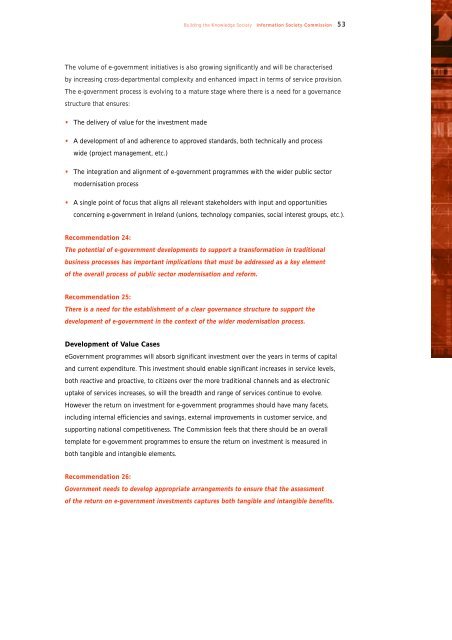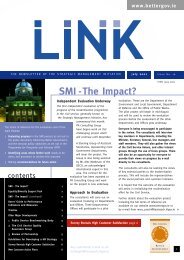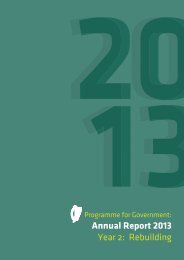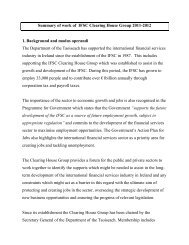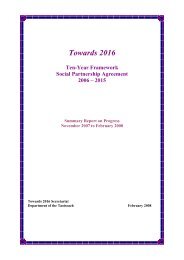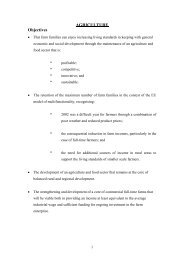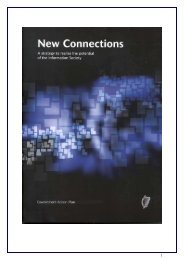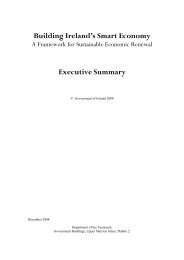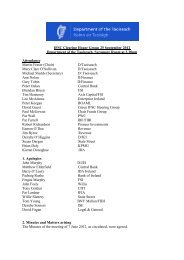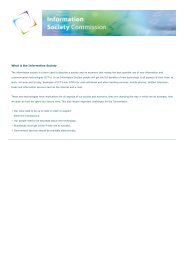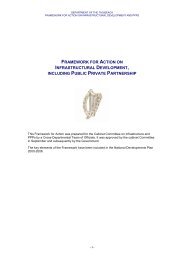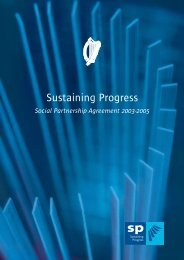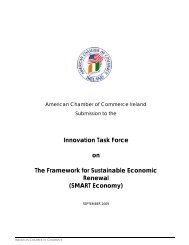Building the Knowledge Society - Department of Communications ...
Building the Knowledge Society - Department of Communications ...
Building the Knowledge Society - Department of Communications ...
Create successful ePaper yourself
Turn your PDF publications into a flip-book with our unique Google optimized e-Paper software.
<strong>Building</strong> <strong>the</strong> <strong>Knowledge</strong> <strong>Society</strong> Information <strong>Society</strong> Commission 53The volume <strong>of</strong> e-government initiatives is also growing significantly and will be characterisedby increasing cross-departmental complexity and enhanced impact in terms <strong>of</strong> service provision.The e-government process is evolving to a mature stage where <strong>the</strong>re is a need for a governancestructure that ensures:• The delivery <strong>of</strong> value for <strong>the</strong> investment made• A development <strong>of</strong> and adherence to approved standards, both technically and processwide (project management, etc.)• The integration and alignment <strong>of</strong> e-government programmes with <strong>the</strong> wider public sectormodernisation process• A single point <strong>of</strong> focus that aligns all relevant stakeholders with input and opportunitiesconcerning e-government in Ireland (unions, technology companies, social interest groups, etc.).Recommendation 24:The potential <strong>of</strong> e-government developments to support a transformation in traditionalbusiness processes has important implications that must be addressed as a key element<strong>of</strong> <strong>the</strong> overall process <strong>of</strong> public sector modernisation and reform.Recommendation 25:There is a need for <strong>the</strong> establishment <strong>of</strong> a clear governance structure to support <strong>the</strong>development <strong>of</strong> e-government in <strong>the</strong> context <strong>of</strong> <strong>the</strong> wider modernisation process.Development <strong>of</strong> Value CaseseGovernment programmes will absorb significant investment over <strong>the</strong> years in terms <strong>of</strong> capitaland current expenditure. This investment should enable significant increases in service levels,both reactive and proactive, to citizens over <strong>the</strong> more traditional channels and as electronicuptake <strong>of</strong> services increases, so will <strong>the</strong> breadth and range <strong>of</strong> services continue to evolve.However <strong>the</strong> return on investment for e-government programmes should have many facets,including internal efficiencies and savings, external improvements in customer service, andsupporting national competitiveness. The Commission feels that <strong>the</strong>re should be an overalltemplate for e-government programmes to ensure <strong>the</strong> return on investment is measured inboth tangible and intangible elements.Recommendation 26:Government needs to develop appropriate arrangements to ensure that <strong>the</strong> assessment<strong>of</strong> <strong>the</strong> return on e-government investments captures both tangible and intangible benefits.


